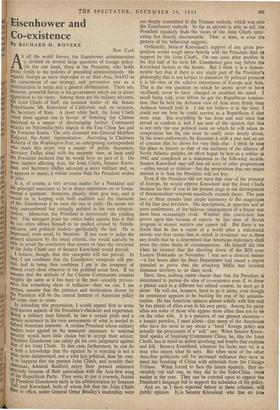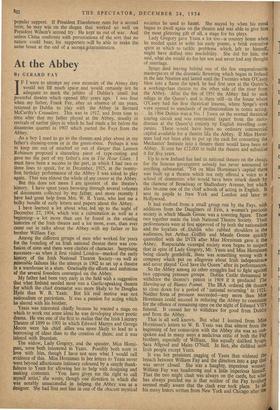Eisenhower and Co-existence
by RICHARD H. ROVERE New York S s all the world knows, the Eisenhower administration is divided on several large questions of foreign policy. On the one hand, there is the President, who holds pretty firmly to the policies of preceding administrations. He regards Europe as more important to us than Asia, NATO as the cornerstone of our strategy, and preventive war as a contradiction in terms and a general abomination. There are, however, powerful forces in his government which are in direct oPposition to his views. Among them are his military advisers, ,the Joint Chiefs of Staff; the nominal leader of the Senate sitepublicans, Mr. Knowland of California; and, on occasion, his Secretary of State. A short while back, the Joint Chiefs voted three against one in favour of bombing the Chinese Mainland as a means of discouraging further Communist attacks on Nationalist-held islands in the East China Sea and the Formosa Straits. The only dissenter was General Matthew Ridgway, the Army representative. According to Chalmers Roberts of the Washington Post, an enterprising correspondent Who made this secret vote a matter of public discussion, Secretary Dulles sided with the majority view, at least until the President declared that he would have no part of it. On ,htcost matters affecting Asia, the Joint Chiefs, Senator Know- land, and Secretary Dulles advocate a more militant and, as it appears to many, a riskier course than the President wishes to take.
It is, of course, a very serious matter for a President and his principal associates to be in direct opposition on so funda- alental a question. Someone, plainly, must give way, and it Would be in keeping with both tradition and the character of Mr. Eisenhower if he were the one to yield. He seems not only outnumbered but virtually isolated in his own adminis- tration. Moreover, the President is notoriously the yielding tsurt. The strongest point his critics make against him is that he too often allows himself to be pushed around by friends, advisers, and political leaders—particularly the last. He is hlipressed, even awed, by Senators. If one were to judge the Present situation by the usual criteria, one would scarcely be able to avoid the conclusion that sooner or later the viewpoint of the Joint Chiefs and of Senator Knowland would prevail. I believe, though, that this viewpoint will not prevail. In fact, I am confident that the Eisenhower viewpoint will pre- vail, and in being thus confident I am in the company of almost every close observer of the political scene here. If we, assume that the attitude of the Chinese Communists remains roughly tile same as it has been in the past—steadily provoc- ative but something short of bellicose—then we can, I am certain, assume that the patience and moderation shown by for President will be the central features of American policy tor some time to come.
In defending this proposition, I would appeal first to some Well-known aspects of the President's character and experience. Being a military man himself, he has a certain pride and a certain assurance in his own assessments of what is needed to leaders American interests. A civilian President whose military were agreed on the measures necessary to national !security would have little choice but to accept their advice; president Eisenhower can safely pit his own judgement against pat of his Joint Chiefs. In this case, furthermore, he can do t with a knowledge that the opinion he is rejecting is not a Whit more disinterested, not a whit less political, than his own. It so happens that the present Joint Chiefs, and notably their chairman, Admiral Radford, enjoy their present eminence precisely because of their association with the Asia-first wing Of the Republican Party. They were, to put it coarsely, foisted 9„11,President Eisenhower early in his administration by Senators ‘,4 Taft t and Knowland, both of whom felt that the Joint Chiefs then in office, under General ()filar Bradley's leadership, were too deeply committed to the Truman outlook, which was also the Eisenhower outlook. So far as anyone is able to tell, the President regularly finds the views of the Joint Chiefs inter- esting but heavily, discountable. That, at least, is what the pattern of his behaviour suggests.
Ordinarily, Senator Knowland's support of any given pro- position would weigh more heavily with the President than its support by the Joint Chiefs. On one issue after another in the first half of his term Mr. Eisenhower gave way before the Knowland faction in the Senate. But I think it is a demon- strable fact that if there is any single part of the President's philosophy that is not subject to alteration by political pressure it is his view of the relative importance of Europe and Asia. This is the one question on which he seems never to have vacillated, never to have changed or modified his stand. I recall being told, even before he got the Republican nomina- tion, that he held the Acheson view of Asia more firmly than Acheson himself held it. I did not believe it at the time; I could not see how he could survive as a Republican if that were true. But everything he has done and said since has served to confirm it, and I am now of the opinion that this is not only the one political issue on which he will refuse to compromise but the one issue he really cares deeply about. In his news conferences, he discusses it with a zest and an air of concern that he shows for very little else. I think he sees his place in history as that of the architect of the alliance of North Atlantic peoples, an effort begun by him as a soldier in 1942 and completed as a statesman in the following decade. Senator Knowland may sell him all sorts of other propositions —either sound or dubious—but the proposition that our major interest is in Asia the President will not buy.
Even if the President did not have this view of the primacy of Europe, he would oppose Knowland and the Joint Chiefs because his fear of war at the present stage in the development of thermonuclear weapons manifestly exceeds theirs. The past two or three months bear ample testimony to the magnitude of his fear and revulsion. His descriptions, in speeches and at news conferences, of the hideous consequences of a future war have been increasingly vivid. Whether this conviction has grown upon him because of reports he has seen of Soviet progress in atomic matters one cannot tell. But there is no doubt that he has a vision of a world after a stalemated atomic war that causes him to shrink in revulsion; nor is there any doubt that he is determined that American diplomacy shall press the outer limits of circumspection. He himself did this when he insisted that the shooting down of the B29 over Eastern Hokkaido on November 7 was not a clearcut matter —a few hours after his State Department had issued a report intended to prove that the attacking MIGs had invaded Japanese territory to do their work.
Here, then, nothing seems clearer than that the President is determined to pursue the idea of co-existence even if, to draw a phrase used in a different but related context, he must go it alone. He will not, however, have to go it alone, even though he sometimes appears to be bucking the rest of his adminis- tration. He has American opinion almost solidly with him and he has plenty of allies even in his own party. Among his party allies are some of those who appear more often than not to bo on the other side. It is a paradox of our present situation— a lunatic paradox, I must admit—that many of the Americans who have the most to say about a ' hard ' foreign policy are actually the proponents of a ' soft' one. When Senator Know- land speaks of bombing Communist China, he, like the Joint Chiefs, has in mind an action involving real bombs that explode and kill. Senator Knowland, whatever his faults may be, is a man who means what he says. But when most of the other Asia-first politicians call for increased militance they have in mind the bombing of China with editorials from the Chicago Tribune. When forced to face the issues squarely, they in- variably cut and run, as they did in the Indo-China crisis earlier in the year. They can be counted upon to oppose the President's language but to support the substance of his policy.
And so, as I have reported before in these columns, will public opinion. It.is Senator Knowland who has no true popular support. If President Eisenhower runs for a second term, he may win on the slogan that worked so well on President Wilson's second try: He kept us out of war. And unless China confronts with provocations of the sort that no nation could bear, his supporters will be able to make the same boast at the end of a secondldministration.



























 Previous page
Previous page